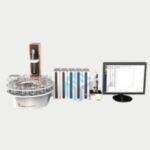Alumina crucibles come in various types based on their composition, manufacturing process, and intended applications.
Here are some common types:
By Purity
- High Purity Alumina Crucibles (99.5% or higher):
- Applications: Used in applications requiring high resistance to chemical attack, high thermal stability, and minimal contamination, such as in analytical laboratories and high-temperature processes.
- Properties: Excellent thermal and chemical stability, high mechanical strength, low thermal conductivity.
- Standard Purity Alumina Crucibles (85% – 99%):
- Applications: Suitable for a variety of industrial applications where extreme purity is not critical.
- Properties: Good thermal and chemical stability, but with some level of impurities.
By Shape and Form
- Conical Crucibles:
- Applications: Ideal for processes requiring precise pouring and minimal loss of material.
- Properties: The tapered shape allows for easy handling and pouring.
- Cylindrical Crucibles:
- Applications: Commonly used in general laboratory and industrial applications.
- Properties: Straight walls provide uniform heating and easy handling.
- Rectangular Crucibles:
- Applications: Often used in specialized applications requiring specific geometries.
- Properties: Rectangular shape provides a larger surface area for reactions or melting processes.
- Crucibles with Lids:
- Applications: Used when the containment of volatile materials or reduction of contamination is required.
- Properties: Lids help to minimize contamination and prevent loss of material.
By Manufacturing Process
- Pressed Alumina Crucibles:
- Applications: Suitable for high-volume production and cost-effective solutions.
- Properties: Typically have good dimensional accuracy and uniformity.
- Slip Cast Alumina Crucibles:
- Applications: Used when complex shapes or larger sizes are needed.
- Properties: Allow for more intricate designs and larger crucibles
- Isostatically Pressed Alumina Crucibles:
- Applications: Ideal for high-stress environments requiring uniform density and high mechanical strength.
- Properties: High uniformity and mechanical strength due to the isostatic pressing process.
By Special Properties
- Thermally Stable Alumina Crucibles:
- Applications: Used in applications requiring resistance to thermal shock.
- Properties: Designed to withstand rapid temperature changes without cracking.
- Chemically Resistant Alumina Crucibles:
- Applications: Suitable for processes involving aggressive chemicals.
- Properties: high resistance to chemical attack and corrosion.
Custom Crucibles
Customized Alumina Crucibles:
- Applications: Tailored to specific requirements of a process or application.
- Properties: Can be designed with specific dimensions, shapes, and properties to meet unique needs.
Selecting the appropriate type of alumina crucible depends on the specific requirements of your application, such as temperature, chemical exposure, and mechanical stress.
M-Kube Enterprise is an Indian company catering customized laboratory products, laboratory consumables, and laboratory solutions in India, Australia, New Zealand, Singapore, Malaysia, South Korea, Dubai, the Philippines, Indonesia, the USA, and Vietnam.





